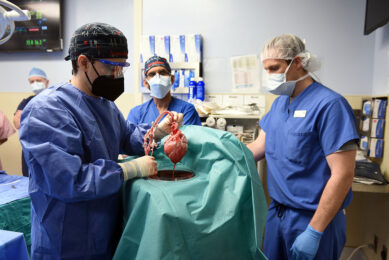PRRSV in British pig herds
The between- and within-herd variability of porcine reproductive and respiratory syndrome virus (PRRSV) antibodies were investigated in a cross-sectional study of 103 British pig herds conducted 2003-2004. Fifty pigs from each farm were tested for anti-PRRSV antibodies using ELISA.
Results
Thirty-five herds (34.0%) were seronegative, 41 (39.8%) were seropositive and 27 (26.2%) were vaccinated.
Herds were more likely to be seronegative if they had <250 sows (OR 3.86 (95% CI 1.46, 10.19)) and if the nearest pig herd was >2 miles away (OR 3.42 (95% CI 1.29, 9.12)). The mean log IRPC in seropositive herds was 3.02 (range, 0.83 – 5.58).
Sixteen seropositive herds had only seropositive adult pigs. In these herds, pigs had -0.06 (95% CI -0.10, -0.01) lower log IRPC for every mile increase in distance to the nearest pig unit, and -0.56 (95% CI -1.02, -0.10) lower log IRPC when quarantine facilities were present.
For 25 herds with seropositive young stock and adults, lower log IRPC were associated with isolating purchased stock for >6 days (coefficient -0.46, 95% CI -0.81, -0.11), requesting >48 hours ‘pig-free time’ from humans (coefficient -0.44, 95% CI -0.79, -0.10) and purchasing gilts (coefficient -0.61, 95% CI -0.92, -0.29).
Conclusions
These patterns are consistent with PRRSV
Persistence of infection may be associated with large herds in pig-dense regions with repeated reintroduction.
Related Website
• BMC Veterinary Research











